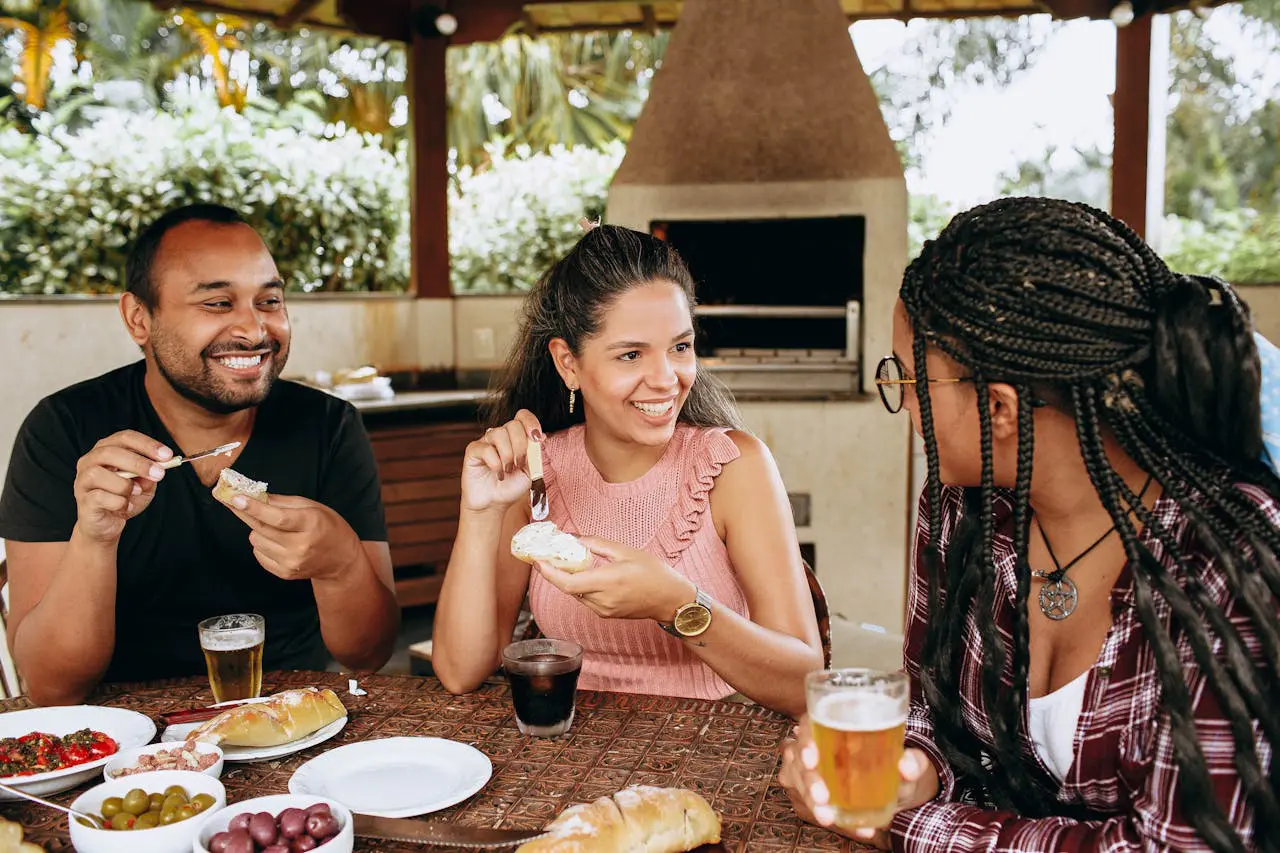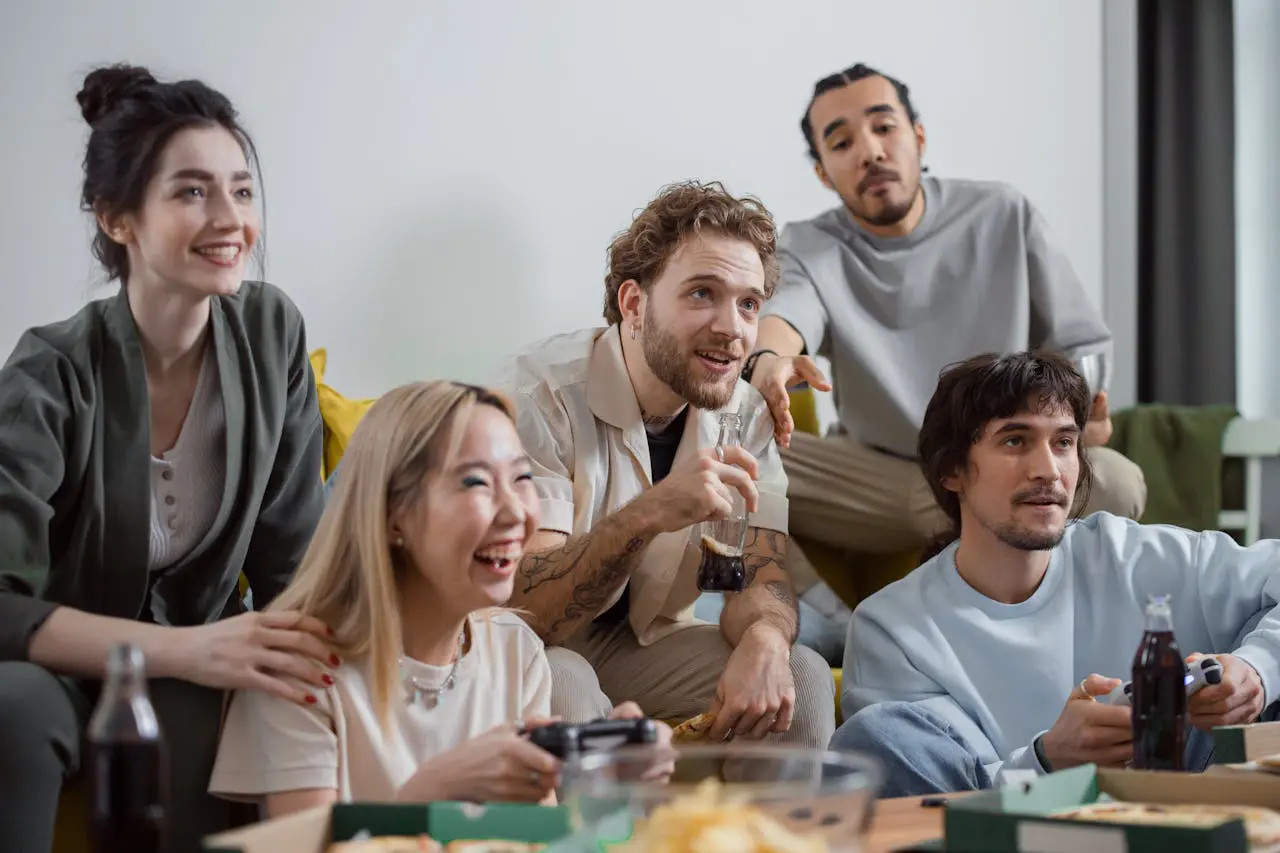In the world of Ethical Non-Monogamy (ENM), finding your people – your tribe – is one of the most rewarding aspects of the journey.
Whether you’re exploring ENM for the first time or have been navigating it for years, creating or joining a supportive community is a game-changer.
Key Takeaways
- Having a supportive community in Ethical Non-Monogamy helps combat isolation, provides guidance, and offers a space to share experiences without judgment.
- Connect through local meetups, online forums, ENM-friendly spaces, and poly organizations to build meaningful relationships with like-minded individuals.
- Prioritize open communication, respect for boundaries, compersion, inclusivity, and mutual support to create a thriving and healthy poly community.
What Is a Poly Tribe?
A poly tribe is a group of people who share similar values, experiences, and goals when it comes to relationships and intimacy.
Think of it as your support squad—a network of friends who understand the complexities of polyamory, open relationships, or any other form of non-monogamy.
These are the people who “get it.”
They know what it’s like to juggle multiple relationships, navigate emotional challenges, and experience the ups and downs of non-traditional intimacy.
Your poly tribe provides a safe space where you can be yourself without fear of judgment.
They’re the ones you can turn to when you need advice, validation, or just a comforting word.
Why Your Poly Tribe Matters
When you’re living a non-traditional lifestyle, the world can sometimes feel a bit… isolating.
- Your family might not fully understand.
- Your friends might ask awkward questions or give you that confused look.
- You might even find yourself questioning your choices, especially in a world that prioritizes monogamy.
That’s where your poly tribe comes in.
Having a tribe gives you a support system of people who understand the unique challenges and beauty of the ENM lifestyle.
They’re the ones who will listen without judgment, offer insightful advice, and remind you that you are not alone.
Your poly tribe helps normalize your experiences and can even offer perspectives on different relationship structures.
They can teach you about healthy communication, provide resources, and share stories of trial and error.
But it’s not just about support.
Your tribe is also a source of fun, adventure, and meaningful connections.
- You might meet new people.
- You might discover new perspectives.
- You might build deep and uplifting bonds.
A poly tribe is a place where you can be your authentic self, free from the pressure to conform to mainstream relationship norms.

Finding Your Poly Tribe
The journey to finding your poly tribe can take many different paths, depending on where you live, your social circles, and how you prefer to connect with others.
Some people find their tribe quickly, while others may take time to cultivate the right group of like-minded individuals who truly get it.
No matter where you are in your journey, know that there are people out there who share your values, experiences, and relationship philosophies.
Here are a few ways to find your polyamorous community and start building meaningful connections.
Attend Poly Events and Meetups
Many cities have regular polyamory meetups, workshops, and social events designed for people who practice ethical non-monogamy.
These gatherings provide a safe, welcoming environment where individuals can meet others, engage in discussions about non-monogamy, and learn from people who have been on the journey longer.
Whether it’s a casual coffee meetup, a panel discussion, or a weekend retreat, attending in-person events is one of the best ways to begin fostering relationships within the polyamorous community.
Where to Find Events
- Meetup.com – Many cities have polyamory and ENM-specific groups that organize meetups.
- Facebook Groups – Search for local polyamory discussion groups where members often share upcoming events.
- Local LGBTQ+ and Sex-Positive Spaces – Many cities have alternative lifestyle hubs, including bookstores, cafés, or community centers that host ENM-friendly events.
If you live in a smaller town, consider traveling to a larger city for meetups, or attending virtual events until you can make in-person connections.
Join Online Communities
If in-person events are not an option, the internet is your best friend when it comes to finding like-minded people in the polyamorous world.
There are thriving online communities where people openly discuss their experiences, offer support, and share advice about navigating non-monogamous relationships.
These spaces can be especially useful for beginners who want to learn more before engaging in real-life meetups.
Where to Find Online Poly Communities
- Reddit – Subreddits like r/polyamory provide a massive, global community where people ask questions, share experiences, and give advice.
- Discord Servers – Many ENM-focused Discord groups create tight-knit online communities where members can chat in real time.
- Facebook Groups – Private and public polyamory discussion groups exist for people to connect, ask questions, and organize meetups.
- Dating Apps – Some apps like Feeld, OkCupid, and Taimi cater specifically to non-monogamous individuals looking to form relationships and friendships.
The beauty of online spaces is that you can connect with people all over the world, making it easier to find your people even if you live somewhere with a small or nonexistent polyamorous community.
Seek Out ENM-Friendly Spaces
Sometimes, your poly tribe may be closer than you think.
Certain places naturally attract people who embrace alternative relationship structures, and simply frequenting these spaces can lead to organic connections.
If you’re unsure where to start, look for venues that openly support open-minded discussions about relationships, sexuality, and identity.
Examples of ENM-Friendly Spaces
- Sex-Positive Cafés & Bookstores – Some independent bookstores, sex-positive cafés, or LGBTQ+ spaces host discussions on polyamory and ethical non-monogamy.
- Kink and BDSM Community Spaces – While not synonymous with polyamory, many people in kink and BDSM communities are also non-monogamous and open to discussing different relationship structures.
- LGBTQ+ Centers and Pride Events – Many people in queer communities are also involved in ENM, making these spaces great for making connections.
By frequenting these spaces, you might naturally meet others who align with your values and start building a poly tribe without even trying.
Get Involved with Poly Organizations
If you want to take things a step further, consider getting involved with established polyamory organizations that provide educational resources, support networks, and community-building events.
These groups can be a great way to meet people who are actively engaged in promoting ethical non-monogamy.
Notable Poly Organizations
- Loving More – A nonprofit dedicated to polyamory education, advocacy, and community-building.
- Polyamory Society – Offers resources, events, and networking opportunities for poly individuals and families.
- National Coalition for Sexual Freedom (NCSF) – Advocates for the rights of people in consensual non-monogamous relationships.
By connecting with these groups, you can gain valuable knowledge, attend events, and find a community that aligns with your values.

What Makes a Strong Poly Tribe?
Once you’ve found your people, the next step is to cultivate the kind of community that helps you thrive.
A strong poly tribe is built on shared values, emotional support, and mutual respect.
Core Elements of a Strong Poly Tribe
Communication
Open, honest communication is the foundation of all healthy relationships, but in polyamory, it is absolutely essential.
Being able to talk openly about your needs, boundaries, and expectations helps prevent misunderstandings and build trust.
In a poly tribe, everyone should feel comfortable expressing their feelings without fear of judgment or resentment.
Respect for Boundaries
Everyone in your poly tribe will have different relationship needs and limits.
Honoring each person’s boundaries—whether emotional, physical, or logistical—is key to maintaining a safe and supportive environment.
A healthy tribe ensures that everyone feels heard, valued, and respected.
Compersion
Compersion is the opposite of jealousy—it’s the joy you feel from seeing your partners happy in their other relationships.
Cultivating compersion in your tribe creates a supportive atmosphere where everyone lifts each other up instead of feeling threatened.
Inclusivity
Polyamory comes in many forms—hierarchical, non-hierarchical, solo-poly, relationship anarchy, and more.
A strong tribe welcomes diverse relationships and identities, ensuring that everyone feels accepted, regardless of how they practice ENM.
Mutual Support
Your poly tribe should be a place where you can seek advice, emotional support, and encouragement.
Whether you need a listening ear, a shoulder to cry on, or a partner to attend an event with, your tribe will have your back.

Challenges and Growth in Your Poly Tribe
No relationship dynamic is perfect, and a poly tribe is no exception.
Conflicts, misunderstandings, and shifting relationship dynamics are all part of the journey.
It’s essential to navigate challenges with patience, compassion, and honesty.
Common Challenges in a Poly Tribe
- Jealousy and Insecurity – Even the most experienced polyamorous people can feel jealous sometimes. Open dialogue and self-awareness can help manage these feelings.
- Evolving Relationships – People’s needs and boundaries change over time. Your tribe must be flexible and understanding.
- Emotional Burnout – Balancing multiple relationships and friendships takes energy. Prioritizing self-care and clear boundaries can help prevent overwhelm.
By embracing these challenges, your poly tribe can grow stronger, deeper, and more fulfilling over time.
Final Thoughts
Your poly tribe is more than just a social circle—it’s a community of trust, love, and support.
Finding and nurturing your tribe is one of the most rewarding aspects of ethical non-monogamy.
These are the people who will celebrate your joys, hold space for your struggles, and grow alongside you.
So go out, connect, and build your polyamorous tribe!

FAQ on Poly Tribes
How do I handle conflicts within my poly tribe?
Conflicts are inevitable in any group. Address issues with open communication, active listening, and respect. Setting clear boundaries and having regular check-ins can help prevent misunderstandings.
What if my poly tribe has different relationship styles?
It’s common for people in a poly tribe to practice different forms of ENM. The key is mutual respect—acknowledge differences and ensure everyone feels comfortable and included.
How do I navigate jealousy within my tribe?
Jealousy is natural and should be addressed with self-reflection and communication. Discuss feelings openly, practice compersion, and establish boundaries that work for everyone.
Can my poly tribe include monogamous friends?
Absolutely! Monogamous friends can be part of your support system, as long as they respect your relationship choices and don’t try to impose their views on your lifestyle.
What should I do if my tribe becomes toxic?
If your tribe fosters negativity, drama, or constant conflict, it may be time to step back. Prioritize your well-being and seek healthier connections with those who align with your values.
How do I maintain my individuality within my tribe?
While community is important, maintaining independence is essential. Set personal goals, nurture solo interests, and ensure your tribe supports your individuality rather than pressuring conformity.
What are some red flags in a poly tribe?
Watch out for controlling behavior, lack of respect for boundaries, exclusivity that fosters cliques, and consistent emotional burnout. A healthy tribe should uplift, not drain, its members.
How can I support newer members of my tribe?
Be welcoming, share resources, and offer guidance without overwhelming them. Encourage questions, provide emotional support, and allow them to navigate ENM at their own pace.

Anna is an anthropologist with a passion for Ethical Non-Monogamy (ENM) and gender and sexuality studies. Through ENM Living, she shares research-based insights and informative content to help others explore and navigate alternative relationship models. Anna is dedicated to creating an inclusive space that celebrates love in all its forms and supports those navigating the complexities of ENM.





